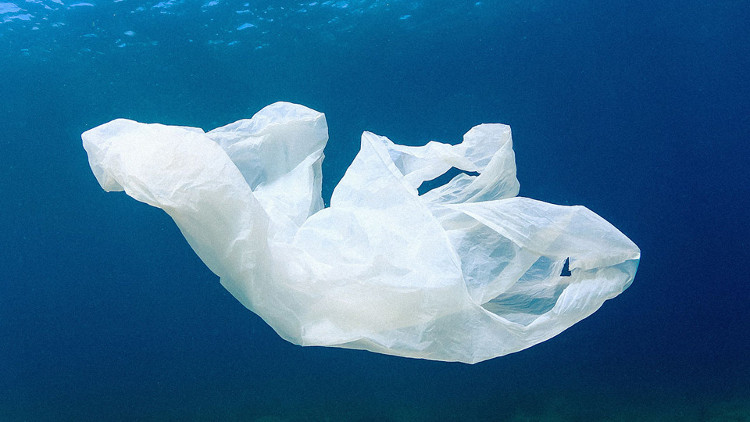Discover a new type of bacteria
A completely new strain of bacteria with the ability to resolve plastic has been discovered by two female students from Canada, promises to create "portable plastic processing plants" , which can reach the collection place, Decompose plastic in time quickly, cheaply and easily applied in many places. This idea is not new but it once again shows the potential of microorganisms in solving future waste problems.
Today people use plastic for many different purposes but then the question is where it will go when we don't use it anymore? The answer is that plastic waste is everywhere. The naturally indestructible nature of plastics leads to once once created, the resin will exist almost forever on Earth. Although many recycling efforts have been made, there is still a large amount of waste on land and in the ocean.

Pollution by oceanic waste can kill marine life.
More serious when the pollution by ocean waste can kill marine organisms, adversely affect the ecosystem. And to fight against plastic, two students in Canada have developed a new strain of bacteria with the ability to eat plastic under the ocean. First, they use a special solvent to dissolve the resin, then use enzymes to break down their structure. Finally, the remaining compounds will be digested by bacteria and the plastic decomposition process will be completed in less than 24 hours.
To do that, they developed a specialized bacterium to eat phthalate - a remarkable chemical contained in plastic. Jeanny Yao, one of the two developers of the plastic decomposition method said: "Although we are not the first team to use bacteria to destroy the structure of phthalate, our success is the group. first developed this approach in the local river, rather than finding an accessible solution to our particular local problems. "
In fact, scientists from many countries are also developing similar solutions, using bacteria to solve plastic problems. Earlier this year, a group from Kyoto University, Japan claimed to have discovered a whole new strain of bacteria capable of digesting compounds in plastics. At the same time, bacteria are not the only species capable of eating plastic. In 2015, Stanford University also discovered that powders are capable of eating polystyrene foam and plastic.

The idea here is that there is no need to collect plastic from the environment and transport it to the gathering yard.
In the near future, a group of 2 students will have to find a way to simplify the entire process of treating plastic with bacteria so that everyone can do it. Currently, they say that another major challenge is to develop a "plastic digestible biological plant" on a truck or a ship. Meanwhile, this vehicle will be able to move to places where there is plastic waste and proceed with the treatment process.
Miranda Wang, the other one in the research group, said: "The idea here is that there is no need to collect plastic from the environment and transport it to the gathering yard. The plastic is very light but takes up a lot of space and therefore will be very The solution here is to have mobile factories go to where they need to be treated ". And to implement the project, the pair created the company called BioCellection and are calling for a donation of $ 20,000 to build the first microbial mobile waste treatment plant.
- Detecting intestinal bacteria helps to lose weight
- 5 health things related to your blood type
- Bacterial bacteria eat DNA to evolve into antibiotic resistant strains
- Gum prevents tooth decay
- Discover shock about bacterial growth in space
- Discover new forms of supernovae
- The most toxic and strange forms of bacteria on the planet
- Check out the types of polar bacteria that are beneficial to humans
- Detecting a bacterium that eats CO2
- France discovered strange bacteria causing death in babies
- Discover new bacteria that cause dental disease
- Identify herbivores, eat meat through intestinal bacteria
 Why do potatoes have eyes?
Why do potatoes have eyes? 'Tragedy' the world's largest carnivorous life: Death becomes ... public toilet
'Tragedy' the world's largest carnivorous life: Death becomes ... public toilet Tomatoes were once considered 'poisonous' for 200 years
Tomatoes were once considered 'poisonous' for 200 years Detecting microscopic parasites on human face
Detecting microscopic parasites on human face Even if humanity becomes extinct, these three traces of humanity will still exist almost forever!
Even if humanity becomes extinct, these three traces of humanity will still exist almost forever!  Microplastics found in more than 50% of clogged atherosclerotic plaques
Microplastics found in more than 50% of clogged atherosclerotic plaques  New Biodegradable Plastic Invention Leaves No Microplastics Behind
New Biodegradable Plastic Invention Leaves No Microplastics Behind  Mealworms - a promising solution to the threat of plastic waste
Mealworms - a promising solution to the threat of plastic waste  More than 6 million tons of plastic waste are floating in rivers, lakes and oceans.
More than 6 million tons of plastic waste are floating in rivers, lakes and oceans.  Turning plastic waste into a trendy trend
Turning plastic waste into a trendy trend 